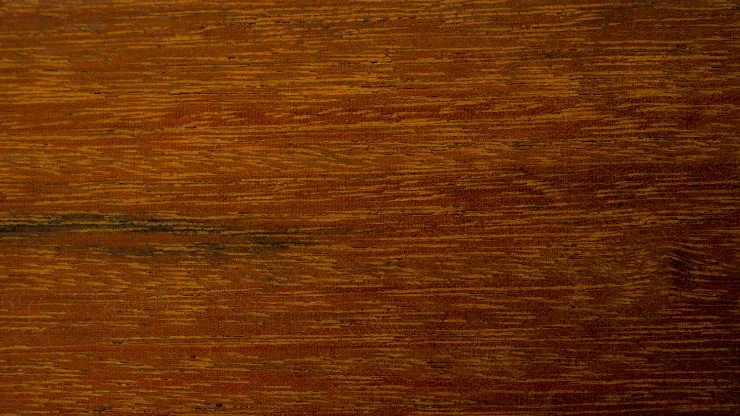What Is Jatoba?
Hymenaea courbaril is an evergreen tree native to the Caribbean, Central America, and South America. It goes by some interesting names, including “stinking toe” and “old man’s toe”. It’s also sometimes referred to as “Brazilian cherry” (although it isn’t a cherry tree), but its most common name is jatoba. Its wood is tough, reasonably cheap, and has many uses besides musical instruments, such as cabinetry, shipbuilding, flooring, and furniture.
How Is Jatoba Used in Guitars?
Jatoba mostly appears on guitar and bass fretboards, where its incredible hardness and durability make it an excellent option. While it’s perfectly suitable for both electric and acoustic instruments, it’s currently more popular on electrics.
Unfortunately, jatoba’s hard and dense nature also makes it pretty heavy, so it doesn’t usually appear elsewhere in guitars. It’s far too heavy to be a choice for solid body guitars, and while it could find use as a guitar neck, better, lighter options are available. Its hardness also makes it quite tricky to work with, so again, there are better options for the front, back, and sides of acoustics.
What do Jatoba Fretboards Sound Like?
As a popular alternative to the increasingly limited rosewood, jatoba has a similarly attractive dark appearance to the fretboard classic and also shares many of its tonal characteristics. Although the differences are hardly chasmic, rosewood has a slightly warmer tone, while jatoba has a more robust mid-range response. It also shares rosewood’s tendencies towards excellent note clarity.
Is Jatoba Easy to Work With?
With a rating of 2,690 on the Janka hardness scale, Jatoba is a tough wood. Harder even than East Indian rosewood. While this characteristic makes Jatoba an excellent fretboard choice, it’s also terrible news for woodworking tools. In addition, Jatoba often has interlocking grains, making planning a challenge. However, it’s a reasonably straightforward wood to glue, stain and finish.
Is Jatoba Sustainable?
Although jatoba is a relative newcomer to guitars, there are currently no concerns about the sustainability of the wood. It is a large tree, averaging 30 – 40 metres tall, while it also has a steady growth rate and is readily available. Because of this, the IUCN Red List lists jatoba as a species of least concern, and it doesn’t appear in the CITES appendices.
Are Jatoba Fretboards Durable?
Jatoba’s hardness and density make for a very durable wood. Whether being walked on as flooring or having strings rubbed against it on a fretboard, it can stand years of wear and tear. It also benefits from excellent resistance to water, wood rot, and insects.
Are Jatoba Fretboards Easy to Maintain?
As an unfinished fretboard wood, caring for jatoba is much the same as looking after an ebony or rosewood fretboard. Its water resistance means you can comfortably remove dirt with a damp cloth before polishing with 0000 steel wool. To keep your jatoba fretboard supple, you can finish things off with a good quality lemon or mineral oil, such as guitar oils by Jim Dunlop and D’Addario.
If you’re used to using a rosewood fretboard, bear in mind that jatoba is a little drier and will need oiling a bit more frequently than you might be used to.
What Are the Pros and Cons of Jatoba?
| Pros | Cons |
|---|---|
| Excellent durability | Not quite as warm as rosewood |
| Strong mid-range performance | Drier than rosewood – slightly higher care needs |
| Great clarity and projection | Quite hard to work with |
| Sustainable | |
| Cheaper than rosewood |
Is Jatoba Wood Good for Guitars?
Jatoba has quickly become one of the go-to fretboard wood choices for some of the top guitar manufacturers. Its sustainability, affordability, durability, and outstanding tonal characteristics make it an excellent replacement for some of the long-cherished but sadly unsustainable classic fretboard woods.
Jatoba Alternatives
While some classic fretboard woods are becoming more scarce, rosewood is still available as a warmer alternative to jatoba if your budget allows it. Or you could even consider one of the other more than capable rosewood subs that are making waves, such as pau ferro or purpleheart.
If you’re looking for a brighter tone, it’s perhaps worth considering maple.
Find Your Jatoba Guitar
If you think a guitar with a jatoba fretboard sounds right for you, then it’s time for every player’s favourite hobby – guitar shopping! And thankfully, our Finder tool is here to make finding your ideal guitar a piece of cake. Just enter your requirements and let the Finder do its magic to help you pick out your perfect guitar.

